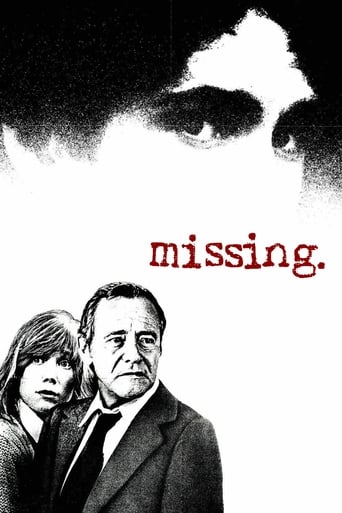

good back-story, and good acting
... View MoreA Brilliant Conflict
... View MoreNot sure how, but this is easily one of the best movies all summer. Multiple levels of funny, never takes itself seriously, super colorful, and creative.
... View MoreA great movie, one of the best of this year. There was a bit of confusion at one point in the plot, but nothing serious.
... View MoreWhen an idealistic writer (John Shea) disappears during the Right Wing military coup in 1973 Chile, his wife (Sissy Spacek) and American businessman father (Jack Lemmon) try to find him.After making many great political thrillers, especially "Z", we finally get one in English. Not that being in English is better than being in any other language, but it does mean it will get a wider audience in the United States. And having both Lemmon and Spacek attached certainly does not hurt.The character played by Jack Lemmon comes off as kind of a jerk, at least for a while. But it is probably a more or less accurate portrayal, because how could any American at the time have suspected that Chile was as awful a place as we now know today that it was?
... View MoreTerry Simon (Melanie Mayron) is trying to go home after the Chilean coup of 1973 but the airport is shut down. She and her writer friend Charlie Horman (John Shea) may have stumbled upon secret American involvement. Charlie goes missing. His wife Beth (Sissy Spacek) comes home to find it trashed. His father Ed (Jack Lemmon) is given the runaround in Washington and goes down to find his only son himself. Ed trusts his government implicitly, dislike his son's choices and dismisses Beth constantly.The ending is never really in doubt and that takes away from the drama. Ed could have been written slightly differently. He has issues with Charlie and Beth. His blind faith in the embassy feels wrong even in relations with his experience in Washington. His mantra should be anything to get his son home. Instead he concentrates more on fighting with Beth. It makes him naive at best but also different from his start. Beth can get a bit preachy too. This is a harrowing story and there are compelling scenes.
... View MoreCosta-Gavras already set the bar high for realistic political thrillers with the fantastic Z and he continues the trend with Missing. Despite the "realism" in pace and story structure with a great sense of danger around every corner, it's still very cinematic in tone, particularly with the Vangelis score and great cinematography. However, that realism does mean the payoffs and resolution at points are unsatisfying. Nevertheless, it's Jack Lemmon and Sissy Spacek who shine with their push and pull characters and although it doesn't feel like a character-driven film, they really make great use of their scenes, even if minor characters aren't as good. Despite good techs, it is a difficult film to get emotionally invested in even though it's engaging in parts but I did really like it.8/10
... View MoreThe first act of Costa-Gavras' "Missing" follows the ill-fated journalist and writer Charles Horman (John Shea) during the aftermath of the 1973' Chilean coup. The event was infamous because it leaded to one of the most notorious dictatorships of the 20th century, General Pinochet, and it was no secret that the CIA backed the 'destitution' of the Marxist democratically elected Salvador Allende. This is another shameful page of the Nixon's chapter that "Missing" clearly denounces. There are no explicit indications that the film takes place in Chile, but the 'based on a true story' says enough.After Charles' disappearance, the movie focuses on his father, Jack Lemmon as Ed Horman, trying to determine the fate of his son. It's not much of an investigation than a series of fruitless researches from the American embassy to some evocative locations such as a stadium turned into a prisoner's camp, hospitals and improvised morgues, and a few friends who saw Charles 'for the last time'... anyway, nothing is left for optimism. Beth, Charles' wife played by Sissy Spacek, assists Ed but while she's resigned to her husband's fate, Ed maintains his hopes to a very high level. As viewers, we're inclined to think like Beth, if only because the first act clearly established the setting's nightmarish aspect. Indeed, with all the threatening curfews, the morally corrupted soldiers, the gunfire shots that pierce every once in a while the relative quietness of the streets, and the cadavers lying just after, we know that any second can lead to a life-and-death situation. And Charles is a portrayed as a rather nosy character to the point of unconsciousness, and as it's mentioned by one of the Embassy's officers, with his habit of taking notes and asking questions, Charles "played with fire" and if he got "burned", he'd be as blamable as an American who'd have messed up with the Mafia. This is why I believe that the core of the film is carried by Jack Lemmon's character. Ed is an average man, a good Christian, who believes that each one should mind his own business; he always disapproved his son's ideals and confronted to his absence, his only choice is to vent his anger on Beth. Yet, despite a benign animosity, the two protagonists combine their efforts to find Charles, their common denominator. And since Beth is resigned, the film's merit is to depict the evolution of Ed's state of mind through the five stages of grief.At first, he's in total denial and can't believe his son would be killed in a country where the American government is represented. He believes in the hypothesis of a hiding, and blames Beth for constantly killing that hope. The next step is anger, he blames his son for his naivety, Beth believes that very idealism is worthy of admiration and not detestation. Step by step, fear becomes clearly palpable, and only an actor of Jack Lemmon is capable to express, with a simple blink of eye or a break in his voice, the mental torture of a man who at the end, only seeks a certitude, no matter how ugly it is. That's Jack Lemmon in one of his greatest movie performances. And his scare increases as he gets more immersed in his son's political connection and their bloody implications. He bargains then with the Embassy, ready to sign any paper, to shut his mouth, if it can bring his son alive, or even wounded. Naturally, when confronted to the reality of Chile, after the heart-breaking visit to the stadium and the morgue, Ed reassembles the facts. One journalist, who was identified by Beth, was one of Charles' friends and the Embassy stated that he left Chile. Ed's arc is closed with the resignation, with the unforgettable "we're going home" said to Beth. We'd never know if he saved her life when he found her taken by police officers, but it was after he learned that his son might have been killed that he understood it wasn't worth risking another life. Hearing the news, she embraces him with a poignant tenderness and a powerful "I love you, Ed", they both have lost the man they loved the most, her husband, his only child, and it's like Charles became the posthumous bridge between two mourning hearts. For me, that's the greatest achievement of "Missing", a wonderful story involving two ordinary characters, magnificently played by Lemmon and Spacek. Indeed, the best scenes of "Missing" feature their interactions and the confrontations with the officials whose antagonistic nature progressively reveals its ugly side. Ed reproaches Beth's attitude in the beginning but his climactic displays of anger are the emotional pay-off we expect, after such an infuriating quest. The human side of "Missing" is communicated through a powerful score from Vangelis, less emphatic than "Chariots of Fire" but subtly poignant. In fact, the two leads' characterizations are so powerful that they reveal what represents for me the film's only flaw, the beginning, rather unnecessary because there's nothing showed in the first act that is not shown when Lemmon comes to Chile. In other words, the film should have begun with him, and only through the search, we would have got more insights about Charles and the way he got himself politically involved. Costa-Gavras sins by an attempt to imitate his own masterpiece, I understand he wanted to denounce the situation in Chile, to make a new "Z", even the concluding monologue has the same frustrating effect. But "Z" was a plot-driven film, deconstructing a political reality, while "Missing" excels more as a character-driven movie where the plot points matter less than their psychological effects. Maybe the temptation to make a political statement was too strong but the film should have been less ambitious on that level, if only because the human tragedy it depicted could be communicated by an actor like Jack Lemmon, in one of his most unforgettable performances.
... View More